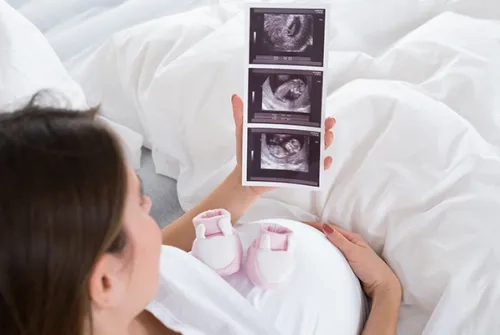Alo Yeditepe
Alo Yeditepe
What Happens at 21 Weeks of Pregnancy?
You have reached the 21st week of pregnancy and the change you are experiencing is palpable. Your baby's kicks are making you even more excited. So, what happens in the 21st week of pregnancy? How does your baby develop in the 21st week of pregnancy? What are the changes in the mother at 21 weeks of pregnancy? Can a 21-week baby be felt? What does a 21-week baby look like?
Yeditepe University Hospitals Gynecology and Obstetrics Department Head and IVF Specialist Prof. Dr. Erkut Attar answered these questions about the 21st week of pregnancy. Here are the answers to the question of what happens in 21 weeks of pregnancy:
How Big is a 21-Week Baby?
This week, the baby is 26.7 cm long and weighs 360 grams, the size of a large carrot.
Can 21-Week Baby Movements be felt?
Other movements begin to increase, and kicks can be felt. These movements fluctuate because the baby is sleeping and waking for short periods.
Baby Development at 21 Weeks of Pregnancy
- Capillaries are developing under the skin and this causes the skin to change color from pink to red, but the skin is still transparent.
- Eyebrows and hair begin to thicken. Facial expressions become more pronounced and movements such as opening the mouth, yawning, and sucking can be observed.
- The placenta has been growing since the beginning of the pregnancy and has been heavier than your baby until this week, from this week onwards your baby will be heavier than the placenta.
How Much Weight Is Gained at 21 Weeks of Pregnancy?
By this week you should have gained an average of 5.4-6.4 kg. Please do not feel fat, as this is a weight gain that is necessary for you and your baby to have a healthy and comfortable pregnancy.
If you suffer from acid reflux and indigestion, we recommend that you reduce your intake of fatty and spicy foods. By keeping track of which foods cause you discomfort and limiting their consumption, you will notice that you will feel more comfortable.
Changes in the Mother at 21Weeks of Pregnancy
Moisturizing your skin as much as possible with oils and body care creams that can be used safely during pregnancy, which you can easily find today, will protect you against less itching and stretch mark development. While most stretch marks that occur during pregnancy are seen with sudden weight gain, if there are other members in the family, the chances of you developing them will increase. Another question that may come to your mind in case of any premature birth is "will my milk come?". Do not worry! Your milk ducts will be fully developed by the end of this trimester.
About
Faculty and Year of Graduation:
Istanbul University, Cerrahpasa Medical School 1986
”
See Also
- Contraceptive Methods: Birth Control and Effective Protection Options
- Genetic Diagnosis in IVF Treatment
- What Happens at 3rd Weeks of Pregnancy?
- What Happens at 2nd Week of Pregnancy?
- What is Endometriosis? What are the Symptoms of Endometriosis?
- What is Pelvic Floor? What are Their Duties?
- The Most Common Diseases in Women
- What is Hysteroscopy? Hysteroscopy Usage Areas
- Early Menopause and Ovarian Failure Can Be Prevented
- Polycystic Ovary Syndrome and its Treatment
- Electromagnetic Stimulation in the Treatment of Endometriosis and Infertility
- Causes of Female Infertility
- Chronic Pelvic Pain
- What is Polycystic Ovary Syndrome/PCOS?
- Postpartum Period
- The Chance of Becoming a Father Increases with Microchip Technology
- Thanks to the Ovarian Rejuvenation Method, She Counts the Days for Birth!
- Some Patients Go Through Menopause Even at the Age of 15
- Useful Bacteria Increases IVF Success
- Polycystic Ovary Syndrome Can Occur If the Bacteria in the Gut Are Not Functioning Well
- Imaging Methods During Pregnancy
- After 16 Years, She Wanted to Be a Mother Again; She Experienced the Shock of Her Life
- These Diseases Affect Women Differently Than Men
- Beware of Chocolate Cyst! It Affects 1 in 10 Women
- Causes of Male Factor Infertility
- The Effect of Advanced Age on IVF Treatment
- Infertility
- Polycystic Ovary Syndrome
- Early Menopause
- Blocked Fallopian Tube
- Vaginismus
- Low Ovarian Reserve (AMH)
- Which Methods Increase Success in Treatment of Infertility?
- Intrauterine insemination (IUI)
- Microinjection
- Egg Cryopreservation
- Assisted Hatching
- Micro-chip
- Pre-implantation Genetic Diagnosis
- Endometriosis
- Co-Culture
- Ovarian Rejuvenation / PRP
- This Problem Ruins the Lives of One in Every 10 Women
- Prof. Dr. Attar: Endometriosis Can Be Associated With Some Chronic Diseases
- What Happens at 38 Weeks of Pregnancy?
- What Happens at 37 Weeks of Pregnancy?
- What Happens at 36 Weeks of Pregnancy?
- What Happens at 35 Weeks of Pregnancy?
- What Happens at 34 Weeks of Pregnancy?
- What Happens at 33 Weeks of Pregnancy?
- What Happens at 32 Weeks of Pregnancy?
- What Happens at 31 Weeks of Pregnancy?
- What Happens at 30 Weeks of Pregnancy?
- What Happens at 29 Weeks of Pregnancy?
- What Happens at 28 Weeks of Pregnancy?
- What Happens at 27 Weeks of Pregnancy?
- What Happens at 26 Weeks of Pregnancy?
- What Happens at 25 Weeks of Pregnancy?
- What Happens at 24 Weeks of Pregnancy?
- What Happens at 23 Weeks of Pregnancy?
- What Happens at 22 Weeks of Pregnancy?
- What Happens at 20 Weeks of Pregnancy?
- What Happens at 19 Weeks of Pregnancy?
- What Happens at 18 Weeks of Pregnancy?
- What Happens at 17 Weeks of Pregnancy?
- What Happens at 16 Weeks of Pregnancy?
- What Happens at 15 Weeks of Pregnancy?
- What Happens at 14 Weeks of Pregnancy?
- What Happens at 13 Weeks of Pregnancy?
- What Happens at 12 Weeks of Pregnancy?
- What Happens at 11 Weeks of Pregnancy?
- What Happens at 10 Weeks of Pregnancy?
- What Happens at 9 Weeks of Pregnancy?
- What Happens at 8 Weeks of Pregnancy?
- What Happens at 7 Weeks of Pregnancy?
- What Happens at 6 Weeks of Pregnancy?
- What Happens at 5 Weeks of Pregnancy?
- What Happens at 4 Weeks of Pregnancy?
- What Happens at 1st. Weeks of Pregnancy?
- Considerations for Embryo Transfer
- What Causes Menstrual Irregularity, How Is It Treated?
- Success in IVF after 43 Decreases to Five Percent
- Does Pregnant Coronaviruses Affect?
- Most Frequently Asked Questions During Pregnancy
- 1 in 10 Women Have This Problem; It Can Lead To Infertility
- Effective Results Can Be Achieved with PRP in Women with Low Egg Count
Alo Yeditepe




